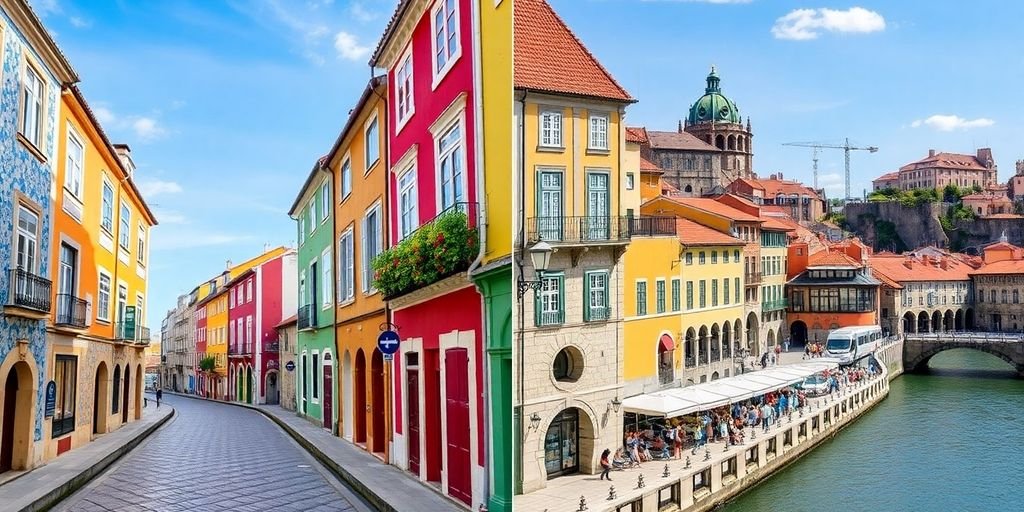
In the vibrant culture of Portugal, the cities of Lisbon and Porto stand out not just for their beauty but also for their unique languages. This article explores the fascinating language differences between these two cities, focusing on how history, pronunciation, vocabulary, grammar, and culture shape the way people communicate. Whether you’re a language enthusiast or simply curious, this showdown between Lisbon and Porto will reveal the richness of Portuguese as it is spoken in these two iconic locations.
Key Takeaways
- Lisbon and Porto have distinct historical influences that shaped their languages.
- Pronunciation varies significantly, with different vowel and consonant sounds in each city.
- Local slang and borrowed words reflect the unique cultures of Lisbon and Porto.
- Grammar and syntax differ slightly, affecting sentence structure and verb usage.
- Cultural elements like music and media play a significant role in language evolution in both cities.
Historical Linguistic Evolution in Lisbon and Porto
Origins of Portuguese in Lisbon
The Portuguese language has its roots in the Latin spoken by the Romans. In Lisbon, this language evolved over centuries, influenced by various cultures. The history of Portugal shows that the region has been inhabited for thousands of years, which contributed to the rich tapestry of its language.
Origins of Portuguese in Porto
Similarly, Porto’s linguistic journey began with Latin. Over time, the language absorbed elements from local dialects and foreign influences. The city’s maritime history brought in words from different cultures, enriching its vocabulary.
Influence of Historical Events on Language
Historical events have played a significant role in shaping the languages of both cities. Here are some key influences:
- Conquests and Colonization: These events introduced new words and phrases.
- Trade and Commerce: Porto’s status as a trading hub led to the adoption of foreign terms.
- Cultural Exchanges: Interactions with other regions brought diverse linguistic elements.
The evolution of language in Lisbon and Porto reflects the cities’ unique histories and cultural exchanges, making them vibrant centers of the Portuguese language.
Pronunciation Differences Between Lisbon and Porto
Vowel Sounds
In Lisbon, the vowel sounds are often more open compared to Porto. For example, the vowel in “pato” (duck) is pronounced as [ˈpatu] in Lisbon, while in Porto, it can sound more like [ˈpɐtu]. This difference can change the meaning of words.
Consonant Articulation
Consonants also vary between the two cities. In Lisbon, the “s” at the end of words is often pronounced softly, while in Porto, it is pronounced more sharply. For instance, the word “mais” (more) sounds like [maɪʃ] in Lisbon and [maɪs] in Porto.
Regional Accents
The accents in Lisbon and Porto are distinct. Lisbon’s accent is generally considered more neutral, while Porto’s has a stronger, more pronounced tone. This can make it easier for locals to identify where someone is from just by their accent.
| Feature | Lisbon Pronunciation | Porto Pronunciation |
|---|---|---|
| Vowel in “pato” | [ˈpatu] | [ˈpɐtu] |
| “s” in “mais” | [maɪʃ] | [maɪs] |
| Accent | Neutral | Strong |
Understanding these pronunciation differences can help in better communication and appreciation of the richness of the Portuguese language.
Vocabulary Variations in Lisbon and Porto
Common Words with Different Meanings
In Lisbon and Porto, some words can mean different things. Here are a few examples:
- Bicha: In Lisbon, it means a line or queue, while in Porto, it can refer to a worm.
- Pão: In both cities, it means bread, but the type of bread can vary.
- Cerveja: While it means beer everywhere, the local brands differ.
Local Slang and Expressions
Each city has its own unique slang. Here are some popular expressions:
- Lisbon: “Estás a gozar?” (Are you kidding?)
- Porto: “Tás a brincar?” (Are you joking?)
- Lisbon: “Fixe!” (Cool!)
- Porto: “Bué fixe!” (Very cool!)
Borrowed Words and Their Usage
Both cities have borrowed words from other languages, especially English. Some examples include:
- Cool: Used in both cities to express approval.
- Tchau: Borrowed from Italian, meaning goodbye.
- Shopping: Commonly used in both cities to refer to going out to buy things.
Language reflects culture. The differences in vocabulary show how each city has its own identity and influences.
In summary, while both Lisbon and Porto share the Portuguese language, their vocabulary reveals unique local flavors and cultural influences. Understanding these differences can enhance communication and appreciation of each city’s rich linguistic heritage.
Grammar and Syntax: A Comparative Analysis
Sentence Structure
In both Lisbon and Porto, the sentence structure can vary slightly. Generally, the basic order is Subject-Verb-Object (SVO), but regional preferences can lead to different emphases. For example:
- Lisbon: Often uses a more straightforward SVO.
- Porto: May place the object earlier for emphasis.
Verb Conjugations
The way verbs are conjugated can also differ. In Lisbon, speakers might favor certain forms that sound more formal, while in Porto, the informal versions are more common. Here’s a quick comparison:
| Verb Form | Lisbon Usage | Porto Usage |
|---|---|---|
| Present Tense | Falo | Falo |
| Past Tense | Falei | Falei |
| Future Tense | Falarei | Falarei |
Use of Articles and Prepositions
The use of articles and prepositions can show distinct patterns. In Lisbon, people might use articles more frequently, while in Porto, they may drop them in casual speech. Here are some examples:
- Lisbon: “A casa” (the house)
- Porto: “Casa” (house)
Understanding these differences helps in grasping the unique flavors of Portuguese spoken in each city. Language is a living entity, shaped by its speakers and their histories.
Overall, while both cities share a common language, the nuances in grammar and syntax reflect their rich cultural identities. Recognizing these differences can enhance communication and appreciation of the Portuguese language.
Cultural Influences on Language in Lisbon and Porto
Impact of Music and Arts
The rich cultural scenes in both Lisbon and Porto have significantly shaped their languages. Music genres like Fado in Lisbon and traditional folk music in Porto have introduced unique expressions and vocabulary. Here are some key influences:
- Fado: A genre that reflects the soul of Lisbon, often using specific terms and phrases.
- Local Festivals: Events like the Festa de São João in Porto bring unique slang and expressions.
- Art Movements: Various art movements have influenced the way people communicate, especially in urban areas.
Role of Education Systems
Education plays a crucial role in language development. In Lisbon and Porto, schools emphasize different aspects of the Portuguese language:
- Curriculum Differences: Lisbon may focus more on literature, while Porto emphasizes practical language use.
- Language Programs: Both cities offer programs that promote regional dialects and expressions.
- Cultural Exchange: Universities in both cities encourage students to explore local languages and dialects.
Media and Popular Culture
The media in Lisbon and Porto also reflect and shape language use:
- Television Shows: Local shows often highlight regional slang and expressions.
- Social Media: Platforms like Instagram and TikTok have popularized certain phrases and terms.
- Literature: Authors from both cities contribute to the evolution of language through their works.
The cultural richness of Lisbon and Porto not only influences the language but also fosters a sense of identity among their residents. Understanding these cultural nuances is essential for grasping the full picture of Portuguese language evolution.
Language in Daily Life: Lisbon vs Porto
Language in Business and Commerce
In Lisbon, many international companies operate, and English is often the main language used in business settings. However, knowing Portuguese can give you an edge. In Porto, while English is also spoken, local businesses prefer to communicate in Portuguese, making it essential for effective interaction.
Language in Social Settings
Social life in Lisbon is vibrant, with many events where English is common. Yet, locals appreciate when visitors try to speak Portuguese. In Porto, the community is more tight-knit, and using Portuguese can help you connect better with the residents.
Language in Government and Administration
In both cities, Portuguese is the official language for all government and administrative matters. However, Lisbon has a more diverse population, which sometimes leads to the use of English in public services. Porto, being more traditional, sticks closely to Portuguese in its administrative processes.
| Aspect | Lisbon | Porto |
|---|---|---|
| Business Language | English (often) | Portuguese (preferred) |
| Social Language | English (common) | Portuguese (more common) |
| Government Language | Portuguese | Portuguese |
Understanding the local language is crucial for a deeper connection with the culture and people in both cities.
Overall, while both cities have their unique language dynamics, embracing Portuguese can significantly enhance your experience in either Lisbon or Porto.
Future Trends in the Portuguese Language in Lisbon and Porto
Impact of Globalization
Globalization is changing how people communicate. Many young people in Lisbon and Porto are adopting English words into their daily conversations. This trend can lead to a mix of languages, making the local dialects evolve.
Technological Influences
Technology is also shaping language. With the rise of social media, new slang and expressions are emerging. For example, terms like “selfie” and “hashtag” are now common in both cities. This influence can be seen in:
- Online communication
- Text messaging
- Social media platforms
Preservation of Regional Dialects
Despite these changes, there is a strong desire to keep local dialects alive. Many people in both cities are working to preserve their unique ways of speaking. This includes:
- Community language programs
- Local cultural events
- Educational initiatives in schools
The future of the Portuguese language in Lisbon and Porto will likely be a blend of tradition and modernity, reflecting the cities’ rich histories and their adaptation to a globalized world.
In conclusion, as Porto explores new ways to manage its cultural identity, Lisbon may follow suit. Both cities are at a crossroads, balancing the old with the new in their linguistic journeys.
Final Thoughts on the Lisbon vs Porto Rivalry
In the end, the battle between Lisbon and Porto is more than just a game; it’s a clash of pride and passion. Both teams have shown they can win, making this rivalry exciting for fans. Porto has had the upper hand lately, but Sporting Lisbon is always ready to fight back. As they prepare for their next match, both teams will bring their best, hoping to claim victory. This showdown promises to be thrilling, and no matter who wins, the spirit of competition will shine through.
Frequently Asked Questions
What are the main differences in pronunciation between Lisbon and Porto?
Lisbon and Porto have different ways of saying words. For example, the vowel sounds can change, making the same word sound different. Accents also vary, with each city having its own unique style.
How does the history of each city influence its language?
The history of Lisbon and Porto has shaped their languages. Events like wars and trade brought new words and phrases, making the language in each city unique.
Are there any famous slang words from either city?
Yes! Both Lisbon and Porto have local slang. For instance, people in Lisbon might use words that are not common in Porto, and vice versa.
How do grammar rules differ between the two cities?
While both cities use the same basic grammar, there can be small differences in how sentences are structured or how verbs are used.
What role does music play in the language of Lisbon and Porto?
Music greatly influences language in both cities. Styles like Fado in Lisbon and different local music in Porto can introduce new words and expressions.
Will the Portuguese language change in the future?
Yes, languages change over time. Globalization and technology will likely affect how people in Lisbon and Porto speak, but local dialects will still be important.



